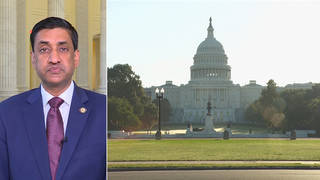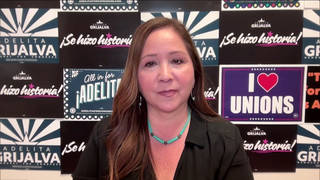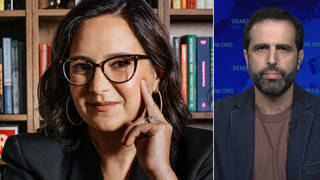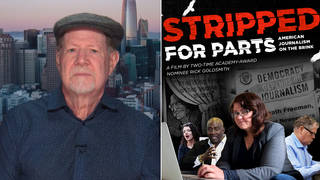
Topics
Guests
- Joe Whinneyfounder and CEO of Theo Chocolate, which describes itself as the only roaster of organic cocoa beans and the first roaster of Fair Trade certified cocoa beans in the United States.
We speak to Joe Whinney, founder and CEO of Theo Chocolate, which describes itself as the only roaster of organic cocoa beans and the first roaster of Fair Trade certified cocoa beans in the United States. [includes rush transcript]
Transcript
AMY GOODMAN: If you’re still craving chocolate and wondering about Fair Trade options and how exactly Fair Trade chocolate is certified, we’re joined in Washington by Joe Whinney. He’s founder and CEO of Theo Chocolate, which describes itself as the only roaster of organic cocoa beans and the first roaster of the Fair Trade certified cocoa beans in the United States. He’s joining us from Seattle, Washington.
Welcome, Joe. What is Fair Trade chocolate?
JOE WHINNEY: Thanks for having me. Fair Trade chocolate is chocolate that certifies that all the way back to the farm, that workers are treated fairly, that they have safe working conditions, that children of cocoa farmers have access to education. And in order to be Fair Trade certified, the farmers have to be organized in a democratic cooperative. So they get to choose how the Fair Trade premium is spent within their communities and organization.
JUAN GONZALEZ: And, Joe, how are you able to certify or determine that the cocoa is grown under those conditions?
JOE WHINNEY: We depend on an independent third party, TransFair USA, which is part of the global Fair Trade label organizations around the world. And they go to the cocoa farms and the cooperatives to verify that these conditions and their standards are met. So we depend on their inspections for the integrity of the certification.
AMY GOODMAN: Can you talk about your own experience, Joe, both in Latin America and in Africa? And where do you get your cocoa?
JOE WHINNEY: Well, we’re buying our cocoa from Madagascar, Ghana, Ivory Coast, Venezuela, Ecuador, Panama, Costa Rica. And I started working as a conservation volunteer more than fifteen years ago in Latin America, working with indigenous cocoa producers in Belize and Guatemala, and really thought that I had seen what poverty was like in the struggles that a lot of farmers have. But then when I went to Africa and was working in development projects there related to cocoa, I was absolutely amazed at the level of poverty.
The thing — I remember the first time I brought chocolate back into some cocoa farms, and there were farmers who had never seen chocolate, even though they grow the beans that go into this product. They had no idea what it tasted like. And they were just amazed at the quality. And then they asked me how much does a chocolate bar cost. And I told them, and, you know, one response was, “Well, I could feed my family for a week for that.” And so, that really — that redefined what it meant to me to participate in producing a luxury product — that is, chocolate. And I have to say that I was changed by my experiences there.
AMY GOODMAN: We just have a minute to go, Joe Whinney, but what do you pay cocoa growers, and how does that differ from the big companies?
JOE WHINNEY: We pay anywhere from two times to four times the futures price, and we pay based on quality first, because if the quality is excellent, then we can make great chocolate that consumers want to buy. So we bring the farmers further up the brand equity chain and take them out of the commodity status. It’s the commodity markets, in and of themselves, that are a large part of this problem. So our consumers experience greater value in the quality of the products. They know that their socially responsible, and they’re willing to pay more. And that money goes right back to farmers.
AMY GOODMAN: And how do you make a profit?
JOE WHINNEY: Well, because we have — we have to make sure that we’re selling at a price that covers our cost of production, our cost of raw materials, and gives us enough money to be reasonably profitable. It’s a very fair and transparent system for us.
AMY GOODMAN: Are you able to get word out, given your profit margin, that these Fair Trade chocolates exist, especially on a day like today, on Valentine’s Day?
JOE WHINNEY: Absolutely. We were — yeah, one of the things that’s on — we have a lot of great press on our side. People are interested in this, and they’re looking for alternatives. And organizations like yourself, The Today Show and the New York Times have been talking about our products and the work that we do. So consumers are hearing about us, and I think that we’re on the right path.
AMY GOODMAN: Well, I want to thank you for joining us, Joe Whinney, founder and CEO of Seattle’s Theo Chocolate. We also just saw that Global Exchange is sending the CEOs of major chocolate companies bouquets of Fair Trade certified flowers with a note attached calling on them to make a real commitment to ending child labor on cocoa farms in West Africa.












Media Options